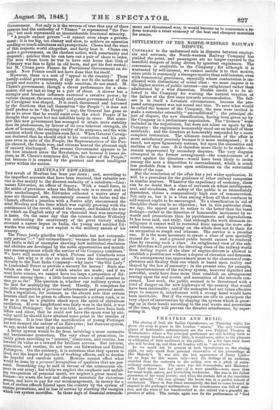LIEUTENANT EDWARDES. LIEUTENANT EDWARDES.
THE revolt of Moulton has been put down ; and, according to the imperfect accounts that have been received, that valuable ser- vice is due mainly to the discreet audacity of a subaltern—Lieu- tenant Edwardes, an officer of Sepoys. With a small force, in the midst of provinces where the British rule is so recent and so little unchallenged, Mr. Edwardes collected a native army of some six thousand men, successively crossed the Indus and the Chenab, effected a junction with a Native ally, encountered the rebel Moulraj and the force which was rapidly growing with the continuance of the revolt, routed the enemy, and finished the war for which an English army of ten thousand men was mustering in haste. On the same day that the veteran Arthur Wellesley was celebrating the anniversary of the great victory which crowned a career begun in India, the young and untitled Ed- wardes was adding a new exploit to the military annals of his country. The Times justly glorifies this "admirable but not extraordi- nary service "—" not extraordinary,' because the history of Bri- tish India is full of examples showing how individual resolution and abilities are developed by the noble opportunities and munifi- cent encouragement which the service of the Company combines." We have still materials of which Pictons and Craufurds were made; but why is it that we should leave the development of chivalry to the East India Company—why leave "the Old Lady" in Leadenhall Street to provide a nursery for heroes Such ma- terials are the best out of which armies are made; and if we must have armies, we cannot have too large a proportion of Ed- wardeses among them ; a little heroism makes a small number in men go so far ! The question is, whether our military system is the best for multiplying the breed. Hardly. It comprises far too little recognition of personal achievements and personal merit. Such a regulation, for instance, as the absurd rule that certain honours shall not be given to officers beneath a certain rank, is as far as it can be a positive check upon the spirit of chivalrous emulation. If ever knighthood was fairly won in the field, it was by Eldred Pottinger ; but he was told, as others have been both before and since, that he could not have the spurs won by chi- valry until he should have attained some point in the routine of promotion. It is true that the mortification of young Pottinger has not damped the ardour of an Edwardes ; but does our system, we say, make the most of its materials ? A better system would be far from involving a more extensive and burdensome promotion. The very abuse of promotion, la- vishly given according to "interest," connexion, and routine, has lowered its value as a reward for brilliant service. But interest, connexion, and routine, do not turn out Edwardses and Eldred Pottingers. On the contrary, it is notorious that they operate to block out the hopes of myriads of working officers, and to deaden the hopeful and emulous spirit. Routine cannot effect what would be done by a personal recognition of qualities that are per- sonal. Something may be said in favour of the aristocratic ele- ?tent in our army; but while we neglect the emphatic and unfail- ing recognition of personal merit, we neglect a great moral in- fluence—we waste the best and cheapest materials for victorious Tames, and have to pay for our mismanagement, in money for a host of useless officers foisted upon the country by the system of routine promotions, and in loss of service by stunting the energies Which oar system mortifies. In these days of financial retrench-
ment and threatened war, it would become us to commence a re- form towards a truer economy of the beat and cheapest materials for armies.


























 Previous page
Previous page